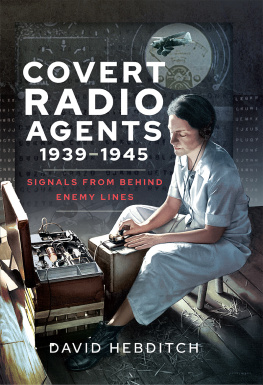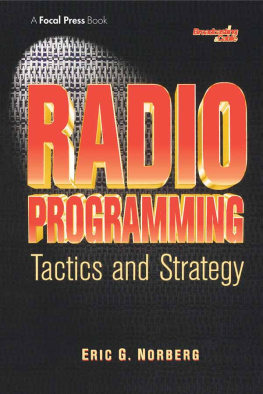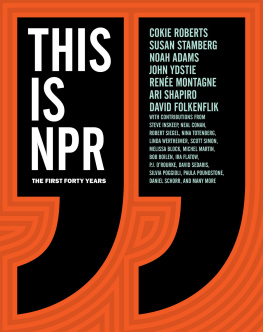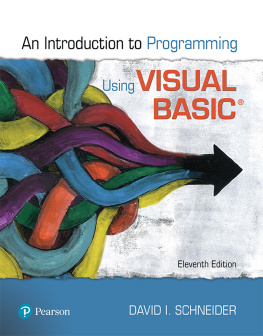ROUTLEDGE LIBRARY EDITIONS:
RADIO
Volume 1
CONTEMPORARY RADIO
PROGRAMMING STRATEGIES
CONTEMPORARY RADIO
PROGRAMMING STRATEGIES
DAVID T. MACFARLAND
First published in 1990 by Lawrence Erlbaum Associates, Inc.
This edition first published in 2017
by Routledge
2 Park Square, Milton Park, Abingdon, Oxon OX14 4RN
and by Routledge
711 Third Avenue, New York, NY 10017
Routledge is an imprint of the Taylor & Francis Group, an informa business
1990 Lawrence Erlbaum Associates, Inc.
All rights reserved. No part of this book may be reprinted or reproduced or utilised in any form or by any electronic, mechanical, or other means, now known or hereafter invented, including photocopying and recording, or in any information storage or retrieval system, without permission in writing from the publishers.
Trademark notice: Product or corporate names may be trademarks or registered trademarks, and are used only for identification and explanation without intent to infringe.
British Library Cataloguing in Publication Data
A catalogue record for this book is available from the British Library
978-1-138-20918-3 (Set)
978-1-315-44344-7 (Set) (ebk)
978-1-138-21545-0 (Volume 1) (hbk)
978-1-138-21567-2 (Volume 1) (pbk)
978-1-315-44352-2 (Volume 1) (ebk)
Publishers Note
The publisher has gone to great lengths to ensure the quality of this reprint but points out that some imperfections in the original copies may be apparent.
Disclaimer
The publisher has made every effort to trace copyright holders and would welcome correspondence from those they have been unable to trace.
Contemporary Radio Programming Strategies
David T. Macfarland
Copyright 1990 Lawrence Erlbaum Associates, Inc.
All rights reserved. No part of the book may be reproduced in
any form, by photostat, microform, retrieval system, or any other
means, without the prior written permission of the publisher.
Lawrence Erlbaum Associates, Inc., Publishers
365 Broadway
Hillsdale, New Jersey 07642
Library of Congress Cataloging-in-Publication Data
MacFarland, David T.
Contemporary radio programming strategies / by David T.
MacFarland.
p. cm.
Includes index.
ISBN 0-8058-0664-4. ISBN 0-8058-0665-2 (pbk.)
1. Radio programs-Planning. I. Title.
PN1991.55.M33 1990
384.54420973dc20 89-16790
CIP
Printed in the United States of America
10 9 8 7 6 5 4 3 2 1
To Charlotte,
who always believed in this book
more than I did
Contents
This book would not have happened without the belief and encouragement of my dear wife Charlotte.
It was Gary Bond who first got me working on a (different) book in earnest; I am sorry that the focus of this one could not have included more of Gary's useful insights.
Without the late Top 40 pioneers Gordon McLendon, Todd Storz, and Bill Stewart, neither American radio's first revolution (nor my dissertation about it) would have happened the same way. Without Edd Routt, there would not have been as much access to that information. Without Larry Lichty, there would not have been the same way of approaching material, nor as much of an understanding of program structure and appeals. Without Chris Sterling's good humor, belief, and support that dissertation probably would not have been published.
Ray Carroll provided early encouragement and proved he meant it by offering to read the rough manuscript. Because he was working on his own book at the time, I let him off the hook on the basis of possible "conflict of interest." But Ray also put me in touch with Jennings Bryant, who encouraged me to submit the manuscript for possible publication by Lawrence Erlbaum Associates. I am grateful to Jennings for his warm follow-up, to Jim Fletcher and Alan Rubin for their fast but useful reviews of my proposal, and to Jack Burton at LEA for offering a contract. It was a delight and a relief to find such compatible people on my first attempt to locate a publisher. Everyone at Erlbaum has been cordial and helpful beyond any expectation. Senior Production Editor Robin Marks Weisberg has been the sort of helper you dream of working with: fixing the awkward constructions, following up the stray references, and figuring out the formatting, while leaving the ideas exactly as I intended them-or better.
Kate Anderson shared some material that introduced the important work of Manfred Clynes. Jack Carpenter pointed me to the literary criticism of Kenneth Burke. Ron Roschke provided several pivotal and insightful brainstorming sessions, lent his books, and offered computer consultation. Marlena Adkison of KTPK-FM donated missing back issues of Radio & Records when I needed them the most. RCS donated instructional copies of their fine "Selector" and "Sampler" software programs to my academic department. Marcia Jensen assimilated and clarified my squiggly drawings and murky figures. Son Michael helped me to have a better understanding of major, minor, and blues scales, and son Jeff assisted with some additional informal music testing among his teenage friends, while they both put up with a cranky, preoccupied dad. My wife Charlotte read all the early drafts, offering valuable advice every time, Chris Sterling gave crucially important suggestions with gentle tact, and Brian Svikhart supplied helpful editing advice.
Members of the A. Q. Miller School of Journalism and Mass Communications at Kansas State University deserve special thanks for helping me to have a "lighter" semester during the time I was finishing the book. I appreciate the faith and protection provided by Department Heads Harry Marsh and Carol Oukrop. Bill Adams co-authored a grant proposal to the KSU Faculty Development Committee that funded research on announcer perception (as well as concurrent studies on music moods and oldies), and Bill was instrumental in the analysis of the data. Stephanie Harvey was indispensable in keeping tab of the funds and in setting up testing sessions, and Linda Davison helped track reprint permissions-there could not be two better secretaries in an academic department. Paul Parsons provided valuable consultation and advice about the publishing process. Rob Daly and Paul Prince both passed along useful articles, and Paul Prince and Bill Adams graciously succumbed to the dubious honor of reading and commenting on my first draft. Paul and Bill, along with RTV colleagues Lee Buller and Dave Deitch and graduate assistant Joe Montgomery, covered some classes and shielded me from the problems of our student radio station when this just had to get done. Lee helped get my clone computer running, and made the initial contact with RCS. Undergraduate students Laurie Anderson and Jodi Johnson both did literature searches on the subject of recurrents, and Jim Ridenour, Mark Kahler, Roger Burns, Ted Smith, Eileen Meyer, Jenny Jones, and Bruce Steinbrock all participated in original research that supports some of the book's premises. And students in several of my classes made comments on early versions of the manuscript that helped to refocus the book in new directions.
Rob Ogles, Steve Shields, and Frank Chorba of the Popular Culture Association's Radio Interest Group invited me to give a convention paper that constituted the first public presentation of my heretical theories of music selection and presentation. That positive experience on the academic side encouraged me to re-establish contact with Unistar executive Gary Taylor, who offered useful advice and insights over the part of the draft he was able to read before deadlines intervened.













